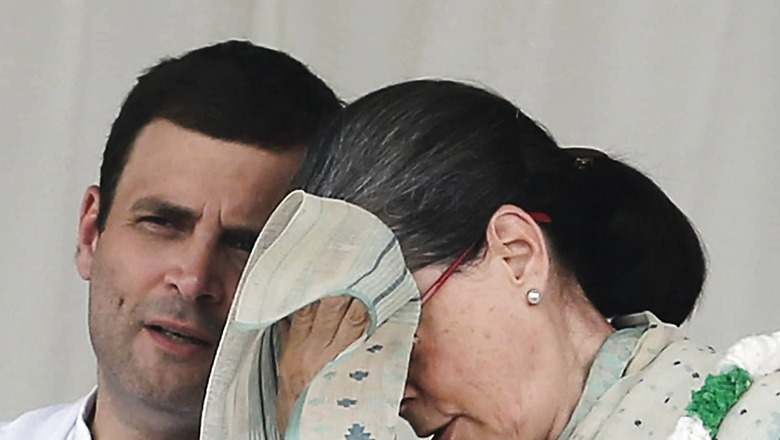
views
The Congress is facing perhaps one of its worst crises ever and the problems lie within. From a host of senior leaders openly defying the top leadership raising questions on the absence of a solid structure at the top to infighting in at least four state cadres, the constant tussle is chipping away at the party’s chances of even putting up a winning fight in 2024, and leaving it little time for anything else.
It began in 2019 after Congress scion Rahul Gandhi stepped down from the post of party president citing the Lok Sabha poll debacle after Prime Minister Narendra Modi led BJP stormed to power for a second term. Two years on, the party is yet to decide on a replacement while Sonia Gandhi holds the interim charge.
The Congress’s footprint has been shrinking since 2014, the year Modi came to power for the first time. The Congress is currently in power in six states but has its own chief ministers in only three – Punjab, Chhattisgarh and Rajasthan. In Jharkhand, Maharashtra and Tamil Nadu, the party is just a junior alliance partner.
Kerala might be one of the newest entrants to the party’s infighting woes after veteran Congress leader and KPCC former general secretary, K P Anil Kumar, who was under suspension for ‘indiscipline’, resigned on Tuesday. Currently, the Congres is facing rebellion in three other states – Punjab, Chhattisgarh and Rajasthan.
“I am ending my 43 year-long relationship with the Congress party,” Kumar told reporters in Thiruvananthapuram. He said though he had submitted his explanation after the party action against him last month, the suspension was yet to be revoked. Soon after the leader announced his resignation, KPCC chief K Sudhakaran issued a press note saying Kumar was expelled from the primary membership of the party.
The Congress in Kerala had “temporarily suspended” Anil Kumar along with former MLA K Sivadasan Nair on August 29 for publicly expressing displeasure over the selection of the party’s district chiefs in the state by the AICC,
G-23: The first visible crack
In August last year, 23 veterans and some of the most powerful faces of the party after the Gandhis wrote a letter to party chief Sonia Gandhi, asking her for “sweeping changes” in the party. The list includes five former chief ministers, sitting MPs Shashi Tharoor and Manish Tewari, members of Congress Working Committee and over a dozen former union ministers with years of political experience.
In the letter, the letter called for full time and effective leadership, visible and active in the field, elections to the Congress Working Committee (CWC) and an “institutional leadership mechanism” aimed at the party’s revival. The signatories also wrote that the party’s revival was imperative at a time “when the country faces the gravest political, social and economic challenges since Independence”.
In another public show of dissent in February, the G-23 leaders (as they came to be known), including Ghulam Nabi Azad, Anand Sharma and Kapil Sibal, publicly vented out their anger and ahead of the assembly elections in Kerala, Assam, West Bengal, Tamil Nadu and Puducherry, and said the ‘party was weakening and they have come together to strengthen it’.
“It is an occasion to speak the truth and I will speak the truth. Why have we gathered here? The truth is we can see that the Congress is weakening. We had gathered earlier also and together we have to strengthen the Congress,” Sibal said addressing an event dedicated to Mahatma Gandhi in Jammu.
Azad, who was among the vocal letter-writers, was not given a renomination after his Rajya Sabha tenure ended.
Punjab: The sticky wicket
In Punjab, Navjot Singh Sidhu has not missed any opportunity to take on Chief Minister Captain Amarinder Singh despite repeated pleas from the party high command and state in-charge Harish Rawat. The two leaders have shared frosty ties for long and their differences came to a head when Sidhu was invited by Pakistan Prime Minister Imran Khan, a colleague from their cricketing days, for his oath-taking ceremony in August 2018. Despite Chief Minister Amarinder Singh’s opposition, Sidhu went to Pakistan and also hugged the country’s army chief Qamar Javed Bajwa when the latter talked about Islamabad’s intention of opening the Kartarpur Sahib corridor for Sikh pilgrims.
Further in 2019, Sidhu had blamed Singh after his wife was denied a Lok Sabha ticket from Chandigarh. The chief minister had denied the charge.
Tensions between the CM and Sidhu flared up in April this year after the Punjab and Haryana High court quashed a probe report into 2015 Kotkapura police firing incident. Sidhu had attacked the CM through his tweets over the issue of alleged delay in justice in the 2015 sacrilege and subsequent police firing incidents. The Amritsar legislator had resigned as minister in 2019 after he was divested of his Local Bodies portfolio. Sidhu had joined the Congress after leaving the BJP before the 2017 Assembly polls.
Rajasthan: A choppy ride
The cold war between Rajasthan Chief Minister Ashok Gehlot and his now sacked deputy Sachin Pilot began with the Congress picking Gehlot for the chief minister’s post after the 2018 assembly polls in a snub to Pilot. Pilot’s supporters said he deserved credit for the party’s victory election after a campaign helmed by him as its state unit chief. The Congress in July last year removed Pilot as Rajasthan deputy chief minister and state party chief after he mounted a rebellion against Gehlot, and also the Rajasthan speaker sent disqualification notice to him and 18 other MLAs after they defied a party whip to attend two Congress Legislature Party meetings. However, fearing a Jyotiraditya Scindia-like fiasco in Rajasthan, he was placated enough by the party high command to remain in the party. Scindia brought down the Kamal Nath government by jumping ship to the BJP with his 20 loyalist MLAs last year.
Pilot has so far maintained a dignified position in public accepting his role in the state after being sacked as Deputy CM, but his patience is being tested as deliberations by the party for nearly two months now for a cabinet reshuffle have not resulted in any action. He has been demanding that his loyalists be accommodated in the Rajasthan Cabinet before the assembly session in the state begins but Gehlot seems to be in no mood to relent despite several public displays of bonhomie and assurances of ‘forgive and forget’.
Chhattisgarh: A 50-50 choice
Chhattisgarh Chief Minister Bhupesh Baghel and Health Minister TS Singh Deo were called to Delhi by the Congress high command late last month where the two were told to clear their differences and to do it soon. The political corridors of Chhattisgarh had been rife with speculations that the meeting was on discussions of the CM’s alleged two-and-a-half-years formula.
Deo claimed that according to an agreement made after the Congress came to power in Chhattisgarh in 2018, he should have got the chief minister’s post after 2.5 years. Bhagel had denied the claim. Sources say that this has been a major reason for a growing rift between the two politicians. Weeks ago, Deo had flayed the Baghel government’s plan of roping in private players for boosting healthcare in the state and said he wasn’t consulted on the matter.
The Chhatisgrah Congress plunged into another crisis in August after MLA Brahaspat Singh accused Deo of plotting his murder following an attack on his motorcade. An upset Deo had stormed out of the assembly and the matter was only settled after the intervention of senior leaders.
Infighting popped up in the party yet again as the health minister inaugurated the party office Rajiv Bhawan in Sarguja and the premises was re-inaugurated by food minister Amarjeet Bhagat by cutting a ribbon. Supporters of both the leaders also had come to blows.
Read all minute-by-minute news updates for Uttar Pradesh election results 2022, Punjab election results 2022, Uttarakhand election results 2022, Manipur election results 2022, and Goa election results 2022.
Click here for seat-wise LIVE result updates.


















Comments
0 comment